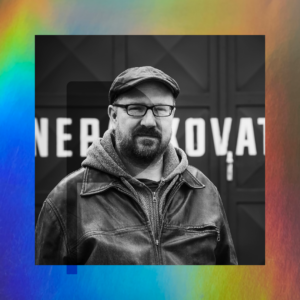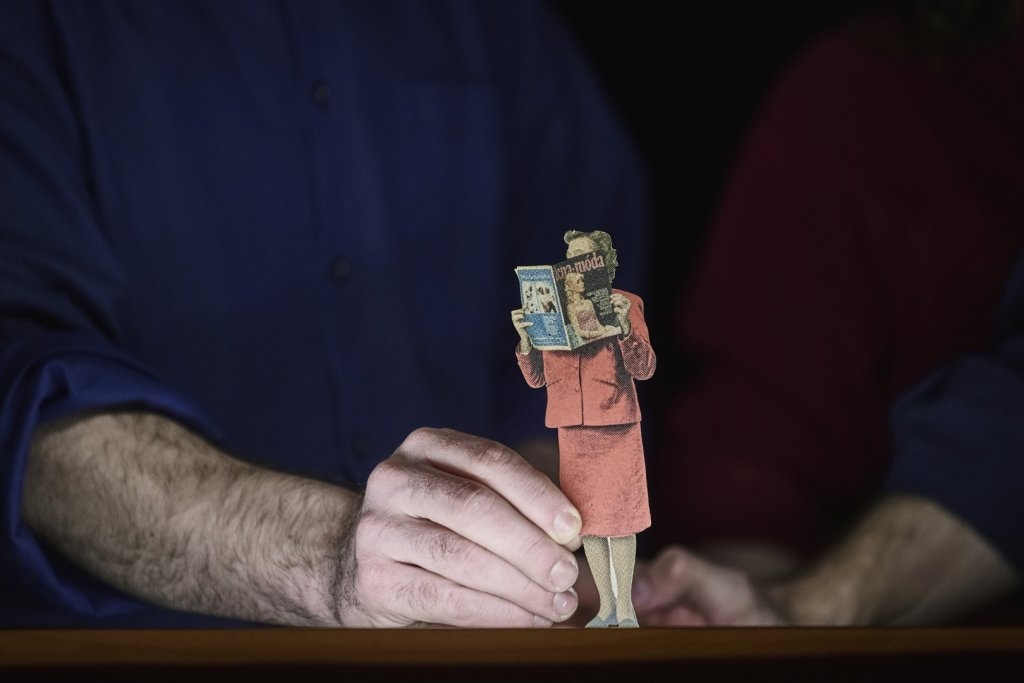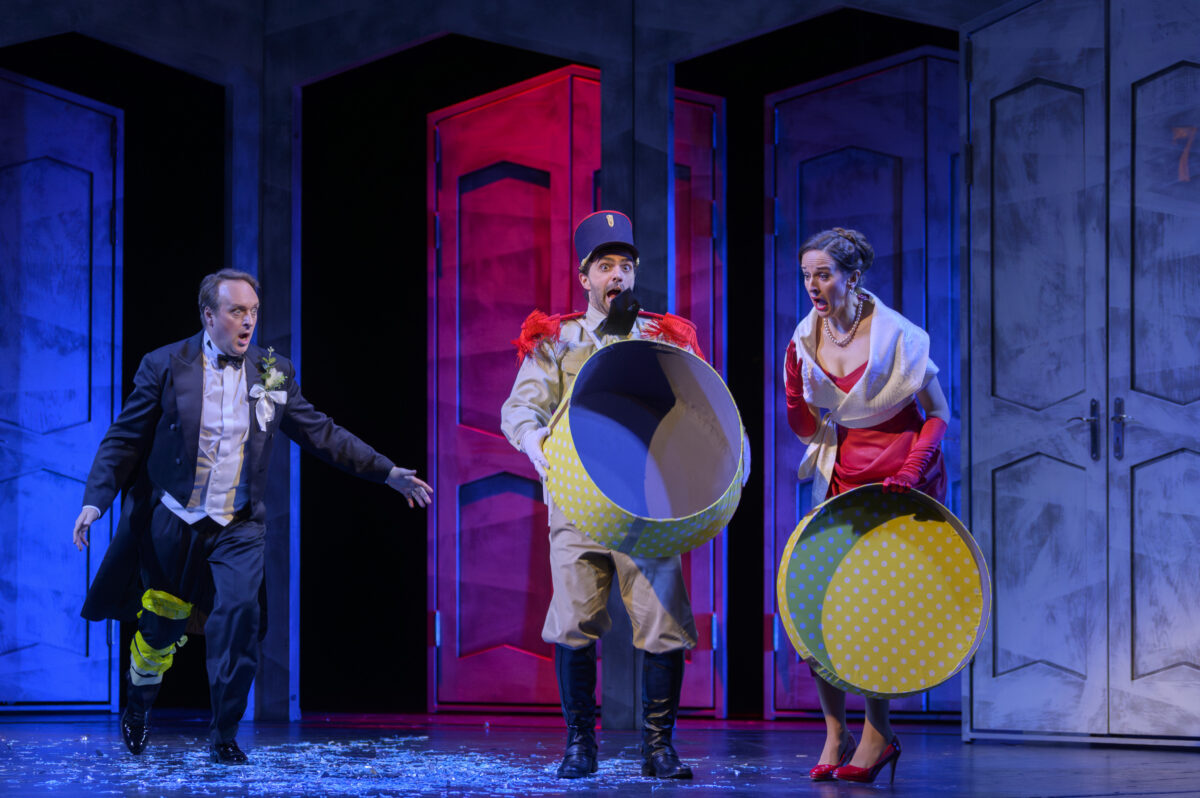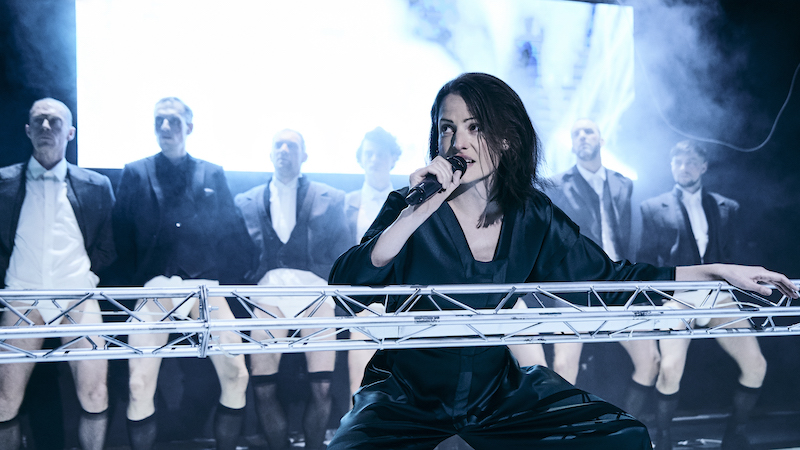
Interview by Barbora Schnelle
Roman Sikora is a Czech playwright, journalist, translator and lecturer. He studied at the Theatre Faculty of the Janáček Academy of Performing Arts in Brno in the Department of Theatre Dramaturgy. He has had a number of jobs, working for example at the Třinec Ironworks and as a night receptionist at the Brno City Theatre. As a theatre critic, he has collaborated with Literární noviny, Lidové noviny, Czech Radio 3 Vltava and the magazine Svět a divadlo (World and Theatre). He was the cultural editor for the online periodical Deník Referendum and occasionally contributes to other media. He is the author of over thirty theatrical plays, of which many have been presented on domestic and foreign stages. In 1998, he took second place in the Alfréd Radok Foundation’s competition for the best Czech play with Smetení Antigony (The Detritus of Antigone). His play Zpověď Masochisty (The Masochist’s Confession) has been translated into many languages and presented in Poland, Switzerland, Germany, France, Brazil, Estonia, Russia and Italy. In 2017, his play Zámek na Loiře (Chateau on the Loire) won first prize in the TALKING ABOUT BORDERS competition, organised by the Staatstheater in Nuremberg, where the play was also performed a year later. He is also the author of a number of theatrical adaptations and has written several radio plays for Czech and Slovak radio.
Your plays are social farces that call out the exploitative structures of the capitalist system with their harsh humour. In your eyes, what advantages does theatre offer for such a targeted critique?
The theatre has very few advantages in this direction. It actually has a lot of disadvantages. In comparison with other media, for example, its reach is minimal, it is capable of reaching very few people. One then has to wade through the scrum of volunteer ideological guardians of capitalism, of which there are many in Czech theatre. One of the few advantages, however, is the immediacy with which it appeals to the spectator. And the ability to share with people, at a particular moment in a particular place, an image of the world in which we live, presented through the playfulness, phantasy and enchanting naivety of the medium. In this way, theatre can be very inventive.
Even with the international success of your plays, your clear anti-capitalist position leaves you in a difficult position in the Czech theatre environment. You are often referred to by critics as a left-wing playwright, which in the strongly right-wing environment of the Czech Republic almost amounts to an insult. I have the feeling that the generation of emerging artists is changing this discourse. How do you explain it?
I always laughed at how every time they talked about me or anyone else with leftist views, they emphasised that the person was a “leftist,” but they spoke about right-wing artists and journalists without adjectives, as if it was something normal, correct and healthy. Then the “leftist” always came off as some kind of extremist or sick person, as something unnatural, a deviation. But commentators always felt like the ultimate democrats, even though today and on a daily basis they demonstrate the essence of non-democracy, intolerance and ideological segregation. Because there were very real existential consequences for the “leftist” in question. The vast majority of my generation is ideologically to the right, because only that could have given them access to some solid work in culture, in the media, in institutions, etc., which after the revolution were completely occupied by a generation of anti-communist and generally anti-leftist “revolutionaries,” very few of whom were really involved in the pre-revolution dissent. With the arrival of the younger generations, it’s changing a bit. Many young people have ceased to have any illusions about the system in which we live. And they’re willing to take a critical position towards it. Because they see that their prospects for employment, fulfilment and survival are and continue to become increasingly worse. To say nothing of the disasters that await them in the future.
In July of 2020, at a time when Czech politics found itself in one of the deepest crises of the post-November era and was dominated by populism and oligarchic structures, all further compounded by the pandemic situation, you premiered your new play Opravdu živé interview s opravdu živým Petrem Kellnerem (A Real Live Interview with the Real Petr Kellner). The entire play takes place in a psychiatric hospital, and in it, you intentionally blur the line between insanity and unscrupulous business practices. What was the impetus to write it?
The impetus to write is very prosaic. In recent years, I’ve written primarily on commission. A director or dramaturg approaches me and says they need something, or they would like to write about this or that. This is what happened with Divadlo Feste. We agreed that we would focus on the richest Czech, Petr Kellner, who guarded his privacy closely, appearing virtually nowhere and giving almost no interviews. A real representative of the “hidden elite.” At that time, of course, he was still alive. About six months after the premiere, he died in a helicopter crash at his favourite luxury adrenaline ski resort in Alaska. The basic premise of the play is quite simple: people who accumulate wealth to the extent that Petr Kellner and his ilk do really are mentally ill. And I treated Kellner as such in my play. It was also an opportunity to return to the wild 1990s of the “Czech economic transformation,” as the robbery of the millennium is nobly called, and to show what Kellner and his kind have done and how many lives they have destroyed with their “successful” entrepreneurship. It is, of course, significant that one of the members of this appalling oligarchy was our prime minister not so long ago and probably will be again in a few years’ time.
You also parody oligarchic structures in your play Zámek na Loiře (Chateau on the Loire). Milostpaní, the only female character in the play, is kept under a kind of house arrest by lackeys paid by an absent, though omnipresent, high-ranking Czech politician and businessman. The play was originally produced in Nuremberg, where it was performed without any knowledge of its connection to the Czech environment, where it is understood as confronting the barbarism of today’s top brass, to very positive critical responses. What makes the play universal?
Of course, the play contains several important topics which are not only related to the current Czech situation. Firstly, it tries to capture the primitivism of a part of the oligarchy that emerged from the wild years of transformation and which many people unwittingly consider to be some kind of social elite that got to the top through their industriousness. Unfortunately, they are only elites from a financial perspective. Their mentality is more comparable to mediaeval bandits, and their industriousness is only a myth, since what they mainly needed to succeed was brazenness, an absence of moral scruples and a great deal of brutality. And, of course, a few good friends from the world of politics and finance who were sympathetic to them for various reasons.
Then, of course, there is the theme of the alienation of labour, work to which a person has no relationship at all and often genuinely hates, but does because they are paid for it. In such a context they will allow themselves to be humiliated and turn themselves, semi-voluntarily, into a human doormat.
Last but not least, the play offers a glimpse of the disparity between post-communist and Western Europe related to absolutely unequal incomes and even a double standard in the quality of food, which can be purchased from the same manufacturers in both halves of Europe with markedly different ingredients.
Acting to secure your own profit is a driving force behind many of your characters, often in freakishly absurd contexts. Take Mr B., for example, from the play Tři dny aneb Sestup a vzestup Pana B. (Three Days, or the Rise and Fall of Mr B.), who we first see offering fraudulent loans to clients at his bank and later, when he ends up begging on the street, sets up a similar financial system among the homeless. The dark comedy of your plays is based on the rigorous application of the laws of the market, even in the most intimate or socially challenging situations. What is it about comedy that makes it an appropriate genre for you?
Humour and comedy introduce spontaneity and joyfulness on the stage, even when they are used to address something horrifying. Comedy, at least for me personally, offers much more space for the imagination. When you poke fun at reality and make a fool of yourself, the work is much more accessible to audiences. Humour and comedy have great potential in and of themselves. They’re a force for anarchy and subversion and are intellectually entertaining, but also an effective way to free oneself from the constraints of one’s own mortality. A way of mocking not just the elites, but death itself.
An important tool in your plays is their specific language, which is full of repetitions and redundancies characterised by short, grammatically incorrect, staccato sentences and cyclical statements. You first used this in The Masochist’s Confession. How do you arrive at it?
I’ve always considered stylised stage language to be important. It probably contains an attempt to wrest absolute stage power back from the hands of the director in favour of the author after all of these “theatrical reforms.” To put the author back in play as a legitimate co-creator. To place an obstacle in the director’s path that they can’t afford to disrespect – the power of language set against the strength or weakness of their imagination and stagecraft.
The rhythm of the speech, which drives the performance, is also important, as is maintaining that pace and, with its looping repetitions and incomplete sentences, the audience’s attention. Last but not least, it contains a not insubstantial dose of humour. Above all, the stylisation of the language allows me to break away from realism and create a fictional world, in which reality is distorted and where I can allow myself to construct truly wild plotlines, characters, situations and stories that are phantasmagorical and unhinged, although it often turns out that they’re outstripped by reality.
In 2015, Iris Laufenberg, the then artistic director of the Schauspielhaus in Graz, approached you to write a play on the topic of “Crossing Borders” (Grenzgänge). At that time, she challenged the authors to not be afraid to look deep into history. For this Austrian theatre, you wrote Na cestě k vítězství (On the Path to Victory), a biting satire from the World War I period, set in the Thalerhof internment camp. How did you arrive at this theme?
When I received the offer to collaborate, I started to look for material that would relate to Graz. And I came across information about the first-ever concentration camp on European territory, which was not the work of Germany or Russia, but Austria-Hungary. It was located in Graz and it was called Thalerhof, the same name the Graz airport bears today. When I dove more thoroughly into the topic, I was shocked by the war crimes the Austro-Hungarian army carried out, particularly in Serbia, but also in Ukraine. At that time, there was a prevailing tendency in the Czech Republic to romanticise the Austro-Hungarian era as a nostalgic, monarchical idyll. So I was quite surprised at what brutality was hidden inside this idyll. No war has ever brought any degree of civilisation. Wars bring only suffering, death and the desire for revenge. And they transform humans into unrestrained beasts.
Your plays are very much connected to the style of Bertolt Brecht’s plays, through their political pathos, but also their structure. Your alienation effect is a language of cyclical passages and repetition. What interests you about Brecht, and what about his theatre inspires you today?
Brecht certainly influenced me, that is true. But I can also speak about Heiner Müller and Werner Schwab and also Jan Werich and Jiří Voskovec, and their interwar Osvobození divadlo (Liberated Theatre) in Prague, who very much resemble Brecht in their artistic methods (even if they weren’t familiar with him at all), as well as Jaroslav Hašek, who also influenced Brecht. When I first started to discover Brecht, it was at a time when the common view in the Czech Republic was that he was just a communist with a limited world view. Only after many years did I recognise the simple ideological equation: no restorationist regime needs a critical, deeply questioning, subversive and perhaps even problematically humane spirit to function. What a restoration regime needs, above all, is empathy for the timeless, grievous human plight, which is really no one’s fault and certainly not the fault of the social system.
categories
Drama / Interview

 Learn
Learn






